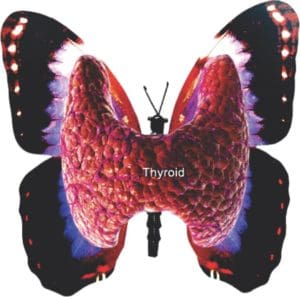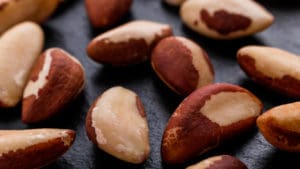Thyroid Gland; the butterfly gland of the body!
Thyroid Health; the butterfly gland of the body 
Today, we delve into the fascinating world of thyroid health. Picture this: a butterfly-shaped gland nestled in the neck, silently orchestrating all aspects of a person’s well-being. But hold on, if you’re dismissing this as irrelevant because you think, “I don’t have or know anyone who has thyroid problems like hyperthyroidism or Graves disease, hypothyroidism or Hashimoto’s,” think again! Thyroid health is intertwined with countless factors that impact our overall health. So, whether or not you or someone you know currently struggles with or is working to manage thyroid hormone production issues, this is a topic to know.
Why you should care about thyroid health
Every one of us possesses a thyroid gland (unless, of course, it has been surgically removed for specific reasons). We all share a common desire for it to function seamlessly – trust me, it’s something we all wish for.
Just as we seldom contemplate our left big toe’s role in walking until we accidentally stub it, or give thought to our molars aiding in grinding and chewing food until a tooth infection arises, the thyroid often goes unnoticed until it communicates its distress through a series of unmistakable signs and symptoms.
Let’s look at the main functions of the thyroid and the hormones it produces:
- The thyroid is the primary control center for the metabolism.
- It plays a crucial role in determining growth rates, especially in young individuals.
- The thyroid facilitates the breakdown and utilization of carbohydrates and fats from dietary intake.
- The thyroid assists in the conversion of beta-carotene found in plant foods into the fat-soluble vitamin A, which is essential for proper immune function, inflammatory response, genetic health, and reproductive well-being.
- The thyroid affects cholesterol levels, blood pressure, appetite, mental sharpness, libido and so much more.
We want our thyroid functioning properly!
What factors affect thyroid function?
Thyroid dysfunction can creep up like the first day of school after summer break. It’s not usually a simple flick of a switch that takes the thyroid from functional to non-functional. Stress, toxins, autoimmune conditions, infections, certain medication, fluoride and deficiency in specific nutrients can all inhibit the necessary production of thyroid hormones. There are a few key nutrients to consider for thyroid health and today’s topic focuses on one of those that’s often overlooked for thyroid health and beyond.
Selenium: A key nutrient for optimal thyroid function and more
Selenium is an antioxidant, a critical constituent in the production of thyroid hormones, and plays a vital role in the conversion of the primary thyroid hormone (T4) to the more bio-active thyroid hormone (T3). Selenium can also counteract the oxidative stress and inflammation that can come from an excess of iodine and its by-products surrounding the thyroid tissue. Selenium has several other important functions in the body beyond the thyroid, and in today’s stressful climate, many of us can be deficient in this important nutrient. Again, a powerful antioxidant, selenium has been identified as a contributing factor in helping to prevent heart disease and cancer, among other things.
How to add Brazil nuts to the diet, according to a Functional Nutritionist
And, since I want to bring it back to a practical, food-first perspective when I can, Brazil nuts are one food that is at the top of the list of selenium-rich foods.
As a Functional Nutritionist, I’ve always suggested that people consume two or three Brazil nuts to start the day, or the same quantity carried in their purse or pocket for a midday snack (if, of course, they are able to eat nuts).
How to store Brazil nuts
You may be thinking of the old, dry rancid Brazil nuts that you snacked around in the nut mix at your grandma’s house, with a shell that’s impossible to remove! But I’m talking about fresh succulent Brazil nuts. They should be creamy, sweet and sometimes even a little smokey. Delicious as they are nutritious!
If your Brazil nuts taste rancid, they probably are. When you sample the best Brazil nuts, you will inevitably come back to tell me that you love them so much that you can’t stop eating them.
Brazil nuts should be eaten raw, sprouted (soaked in water for an hour or two), or dry-roasted without salt.
How to buy Brazil nuts
Talk to the buyer at your local health food store or co-op and find out how their Brazil nuts are being sourced, stored and how long they sit on the shelf. I like to buy mine from a trusted source and keep them in the fridge or freezer. Popping two or three Brazil nuts from the freezer is a great treat! I love buying my brazil nuts at Costco or my local co-op.
Brazil nuts are great, but try not to go overboard
While there are many lifestyle and environmental factors that lead to unwanted selenium deficiency, selenium toxicity is not desirable either. It’s not a danger that many of us need to worry about, but regular consumption of mass quantities of Brazil nuts could, over time, lead to adverse symptoms due to their high mineral stores. Not to mention that a large quantity may deliver more caloric intake than most of us want, need, or can use in one day.
Go to my March 2024 Newsletter for a wonderful Brazil nut tapenade recipe!

